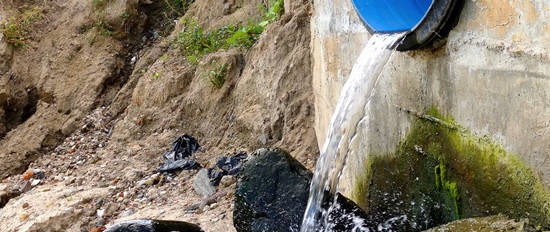|
 Statistics show: only 17 people out of 100 with dysentery go to the doctor. The rest either self-medicate or do not receive treatment at all, which means that out of every 100 patients, 83 become dangerous sources of infection, freely dispersing pathogenic microbes. Statistics show: only 17 people out of 100 with dysentery go to the doctor. The rest either self-medicate or do not receive treatment at all, which means that out of every 100 patients, 83 become dangerous sources of infection, freely dispersing pathogenic microbes.
When such a person completely disappears all signs of the disease, and this can happen very quickly, he becomes practically healthy, but the causative agents of dysentery continue to be excreted from the intestines with feces.
 The danger of such "healthy" infectious agents increases especially if they work in canteens, cafes, restaurants, at a dairy, in a word, where food is prepared and sold to the public. In these cases, the smallest particles of feces from unwashed hands after using the toilet get into the food and begin to multiply in them. The more dysentery microbes accumulate in food, and this happens if the food is kept warm for a long time, the more severe the disease progresses. The danger of such "healthy" infectious agents increases especially if they work in canteens, cafes, restaurants, at a dairy, in a word, where food is prepared and sold to the public. In these cases, the smallest particles of feces from unwashed hands after using the toilet get into the food and begin to multiply in them. The more dysentery microbes accumulate in food, and this happens if the food is kept warm for a long time, the more severe the disease progresses.
 The source of the spread of infection through food can be a bacterium carrier, not only working at a catering enterprise, but also a hostess who prepares food for the family, treats guests, as well as a hostess who has a cow. If she milked her without washing her hands, the causative agents of dysentery will get into the milk, and with it to all those who will drink it unboiled. The source of the spread of infection through food can be a bacterium carrier, not only working at a catering enterprise, but also a hostess who prepares food for the family, treats guests, as well as a hostess who has a cow. If she milked her without washing her hands, the causative agents of dysentery will get into the milk, and with it to all those who will drink it unboiled.
There are other ways of spreading dysentery. Flies can carry its pathogens from sewage to food on their paws.
 If the garden is fertilized with feces that are not neutralized in the compost, pathogenic bacteria penetrate the soil, and from it to the surface of vegetables and berries. Therefore, only neutralized feces are suitable for fertilization, and fruits, vegetables and berries must be washed before use. If the garden is fertilized with feces that are not neutralized in the compost, pathogenic bacteria penetrate the soil, and from it to the surface of vegetables and berries. Therefore, only neutralized feces are suitable for fertilization, and fruits, vegetables and berries must be washed before use.
Sewage containing dysentery pathogens often ends up in rivers, ponds, and lakes. And in order to protect yourself from infection, you need to boil drinking water taken from an open reservoir.
 And yet, the main barrier to the spread of dysentery is the observance of basic hygiene rules. Wash your hands thoroughly with soap and water after using the toilet, before eating, and before preparing food. No wonder dysentery is called "Dirty hands disease". And yet, the main barrier to the spread of dysentery is the observance of basic hygiene rules. Wash your hands thoroughly with soap and water after using the toilet, before eating, and before preparing food. No wonder dysentery is called "Dirty hands disease".
Garden calendar
|
 Statistics show: only 17 people out of 100 with dysentery go to the doctor. The rest either self-medicate or do not receive treatment at all, which means that out of every 100 patients, 83 become dangerous sources of infection, freely dispersing pathogenic microbes.
Statistics show: only 17 people out of 100 with dysentery go to the doctor. The rest either self-medicate or do not receive treatment at all, which means that out of every 100 patients, 83 become dangerous sources of infection, freely dispersing pathogenic microbes. The danger of such "healthy" infectious agents increases especially if they work in canteens, cafes, restaurants, at a dairy, in a word, where food is prepared and sold to the public. In these cases, the smallest particles of feces from unwashed hands after using the toilet get into the food and begin to multiply in them. The more dysentery microbes accumulate in food, and this happens if the food is kept warm for a long time, the more severe the disease progresses.
The danger of such "healthy" infectious agents increases especially if they work in canteens, cafes, restaurants, at a dairy, in a word, where food is prepared and sold to the public. In these cases, the smallest particles of feces from unwashed hands after using the toilet get into the food and begin to multiply in them. The more dysentery microbes accumulate in food, and this happens if the food is kept warm for a long time, the more severe the disease progresses. The source of the spread of infection through food can be a bacterium carrier, not only working at a catering enterprise, but also a hostess who prepares food for the family, treats guests, as well as a hostess who has a cow. If she milked her without washing her hands, the causative agents of dysentery will get into the milk, and with it to all those who will drink it unboiled.
The source of the spread of infection through food can be a bacterium carrier, not only working at a catering enterprise, but also a hostess who prepares food for the family, treats guests, as well as a hostess who has a cow. If she milked her without washing her hands, the causative agents of dysentery will get into the milk, and with it to all those who will drink it unboiled. If the garden is fertilized with feces that are not neutralized in the compost, pathogenic bacteria penetrate the soil, and from it to the surface of vegetables and berries. Therefore, only neutralized feces are suitable for fertilization, and fruits, vegetables and berries must be washed before use.
If the garden is fertilized with feces that are not neutralized in the compost, pathogenic bacteria penetrate the soil, and from it to the surface of vegetables and berries. Therefore, only neutralized feces are suitable for fertilization, and fruits, vegetables and berries must be washed before use. And yet, the main barrier to the spread of dysentery is the observance of basic hygiene rules. Wash your hands thoroughly with soap and water after using the toilet, before eating, and before preparing food. No wonder dysentery is called "Dirty hands disease".
And yet, the main barrier to the spread of dysentery is the observance of basic hygiene rules. Wash your hands thoroughly with soap and water after using the toilet, before eating, and before preparing food. No wonder dysentery is called "Dirty hands disease".








